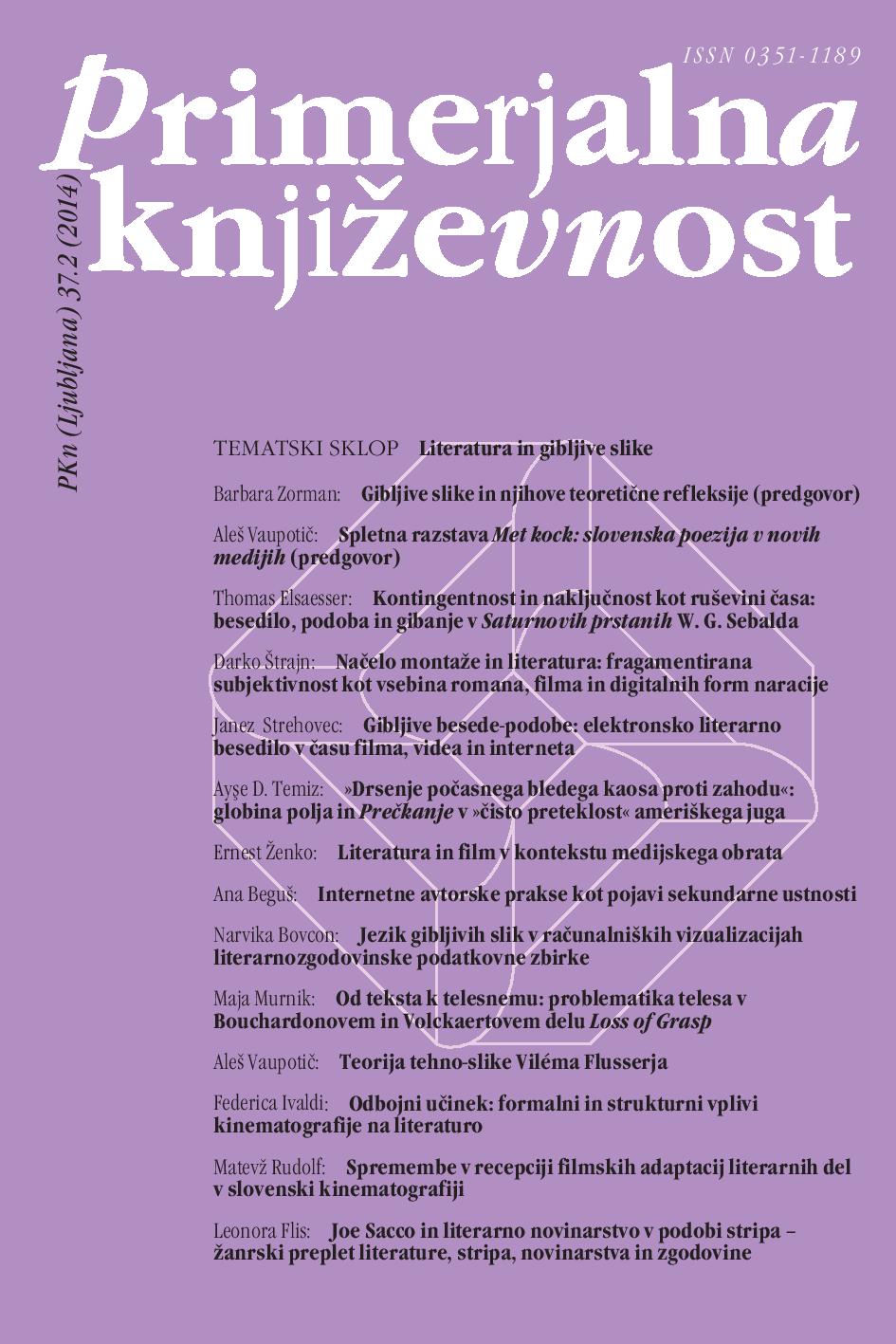The Moving Words-Images: E-Literary Text in the Age of the Film, Video and Internet
Keywords:
literature and new media, electronic literature, video, internet, interface, culture of readingAbstract
This paper aims to explore the electronic animated literature and its attitude towards media art, the Internet culture, and the film. E-literary text shaped by the (new) media belongs to algorithmic culture; however, the mention of film is not such a great departure from e-literature. Electronic textual practice is by no means placed in an area alien to film and the cinematic mode of organization of textual units, which over a decade ago the author of this paper had already named word-image-movement, i.e. the verbal and visual signifier-in-motion. What is crucial here is that the moment when text enters a moving mode it begins to behave like a film, i.e. a film of verbal contents, presenting a challenge to theory, which in turn abandons the field of literary specificity (e.g. literariness as we know it) and begins to direct itself towards effects concerning the cinematic organization of textual contents. Along with the film paradigm also the key features of the Internet culture and the medium of video are deployed to clarify the specificity of novel generation of electronic literature.References
Alexander, Amy. CyberSpaceLand. 2003–. Splet. 19. 5. 2014. http://amy-alexander.com/live-performance/cyberspaceland.html.
Beller, Jonathan. The Cinematic Mode of Production. Hannover in London: Dartmouth Colege Press, 2006.
Benjamin, Walter. »Krisis des Romans. Zu Döblins Berlin Alexanderplatz.« Gesammelte Schriften. III. Frankfurt ob Majni: Suhrkamp, 1972. 230–236.
− − −. »Umetnina v času, ko jo je mogoče tehnično reproducirati.« Izbrani spisi. Ljubljana: SH, Zavod za založniško dejavnost, 1998.
Bolter, Jay David in Richard Grusin. Remediation: Understanding New Media. Cambridge, MA: The MIT Press, 2000.
Bonitzer, Pascal. »Hitchcockian Suspense.« Everything You Always Wanted to Know About Lacan (But Were Afraid to Ask Hitchcock). Slavoj Žižek (ur.). London: Verso, 1992. 15–30.
− − −. Slepo polje. Ljubljana: ŠKUC, Filozofska fakulteta, 1985.
Bouchardon, Serge in Vincent Volckaert. Loss of Grasp. 2010. Splet. 10. 9. 2013. http://lossofgrasp.com/.
Bourchardon, Serge, Kevn Carpentier in Stéphanie Spenlé. Touch. 2009. E-Literature Collection. II. Cambridge, Massachusetts: Electronic Literature Organization, 2011. Splet. 19. 12. 2014. http://collection.eliterature.org/2/works/bouchardon_toucher.html.
Burroughs, William S. Word Virus: The William S. Burroughs Reader. Ur. James Grauerholz in Ira Silverberg. New York: Grove Press, 2000.
Carpenter, J. R. Along the Briny Beach. Splet. 13. 2. 2013. http://luckysoap.com/alongthebrinybeach/alongthebrinycredits.html.
Cayley, John. »Writing to Be Found and Writing Readers.« Digital Humanities Quarterly 5.3 (2011). Splet. 14. 12. 2011. http://www.digitalhumanities.org/dhq/vol/5/3/000104/000104.html.
Cheney-Lippold, John. »A New Algorithmic Identity. Soft Biopolitics and the Modulation of Control.« Theory, Culture & Society 28.6 (2011): 164–181. DOI: 10.1177/0263276411424420.
Crystal, David. Language and the Internet. Cambridge: Cambridge University Press, 2001.
Dinzmore, Claire. The Dazzle as Question. 2002. Splet. 19. 5. 2014. http://poemsthatgo.com/gallery/summer2002/dazzle/launch.htm.
Drucker, Johanna. »Performative Materiality and Theoretical Approaches to Interface.« Digital Humanities Quarterly 7.1 (2013). Splet. 7. 1. 2013. http://www.digitalhumanities.org/dhq/vol/7/1/000143/000143.html.
Ekman, Ulrik. Throughout. Art and Culture Emerging with Ubiquitous Computing. Cambridge, London: The MIT Press, 2013.
Flusser, Vilém. Digitalni videz. Ljubljana: Študentska založba, 2000. (Zbirka Koda).
Galloway, Alexander R. Teorija video iger. Eseji o algoritemski kulturi. Ljubljana: Maska, 2011.
Genette, Gerard. Paratexts: Thresholds of Interpretation. Cambridge: Cambridge University Press, 1997.
Groys, Boris. Google: Words Beyond Grammar. Ostfildern: Hatje Cantz Verlag GmbH, 2012. (Zbirka dOCUMENTA (13): 100 Notizen – 100 Gedanken). Splet. 3. 6. 2014. http://traumawien.at/stuff/texts/groys%E2%80%93googlegrammar.pdf.
Hoover, Wesley A. in Philip B. Gouch. »The Simple View of Reading.« Reading and Writing: An Interdisciplinary Journal 2 (1990): 127–160.
Jameson, Fredric. Postmodernizem. Ljubljana: Problemi – Razprave, 1992.
Karpińska, Aya. Shadows Never Sleep. 2008. Splet. 29. 2. 2014. www.technekai.com/shadow/shadow.html.
Lazzarato, Maurizio. »Machines to Crystallize Time: Bergson.« Theory, Culture & Society 24.6 (2007): 93–122. DOI: 10.1177/0263276407078714.
Lessing, Gotthold Ephraim. Laocoon: An Essay on the Limits of Painting and Poetry. 1766. Prev. E. A. McCormick. Indianapolis, In.: Bobbs-Merrill, 1962.
Manovich, Lev. Software Takes Command. 2008. [Released under CC]. Splet. 3. 12. 2013. http://black2.fri.uni-lj.si/humbug/files/doktorat-vaupotic/zotero/storage/D22GEWS3/manovich_softbook_11_20_2008.pdf.
Mez. »Netwurker.« 16. 12. 2013. Splet. 22. 5. 2014. http://netwurker.livejournal.com/148813.html.
Nelson, Jason. Nothing You Have Done Deserves Such Praise. 2013. Turbulence. Splet. 30. 10. 2013. http://www.turbulence.org/Works/nothing.
Snow, Michael. So Is This. 1982. Splet. 19. 5. 2014. https://www.youtube.com/watch?v=8i6H1KDJ9Ic, https://www.youtube.com/watch?v=uxDLswrcc28, https://www.youtube.com/watch?v=UVusPSFKFaI, https://www.youtube.com/watch?v=O5-LjH62YnM, https://www.youtube.com/watch?v=CQ2S1K7HH6k.
− − −. Wavelength. 1966/67. Splet. 19. 5. 2014. https://www.youtube.com/watch?v=aBOzOVLxbCE.
Strehovec, Janez. »Algorithmic Culture and E-Literary Text Semiotic.« Cultura. International Journal of Philosophy of Culture and Axiology 10.2 (2013): 141−156. DOI: 10.5840/cultura201310218.
− − −. »Digital Literary Text as a Play and a Ride.« Officina di Letteratura Elettronica: Lavori del Convegno. Neapelj: Atelier Multimediale Edizioni, 2011. 381−393.
− − −. »E-Literary Text and the New Media Paratexts.« Examining Paratextual Theory and Its Applications in Digital Culture. Ur. N. Desrocher in D. Appolon. DOI: 10.4018/978-1-4666-6002-1.ch003. Hershey PA: IGI Global, 2014.
− − −. »The Software Word: Digital Poetry as a New Media-Based Language Art.« Digital Creativity 15.3 (2004): 143−158. DOI: 10.1080/14626260408520176.
Stefans, Brian Kim. The Dreamlife of Letters. 2000. E-Literature Collection. I. Cambridge, Massachusetts: Electronic Literature Organization, 2006. Splet. 20. 5. 2014. http://collection.eliterature.org/1/works/stefans__the_dreamlife_of_letters/dreamlife_index.html.
Striphas, Ted. »Who Speaks for Culture?« 2011. The Late Age of Print: Beyond the Book (Blog). Splet. 14. 5. 2014. http://www.thelateageofprint.org/2011/09/26/who-speaks-forculture.
Torres, Rui. Poemas no meio do caminho. 2009. E-Literature Collection. II. Cambridge, Massachusetts: Electronic Literature Organization, 2011. Splet. 13. 2. 2013. http://collection.eliterature.org/2/works/torres_poemas_caminho.html.
Youngblood, Gene. Expanded Cinema. New York: P. Dutton & Co., Inc.,1970.


